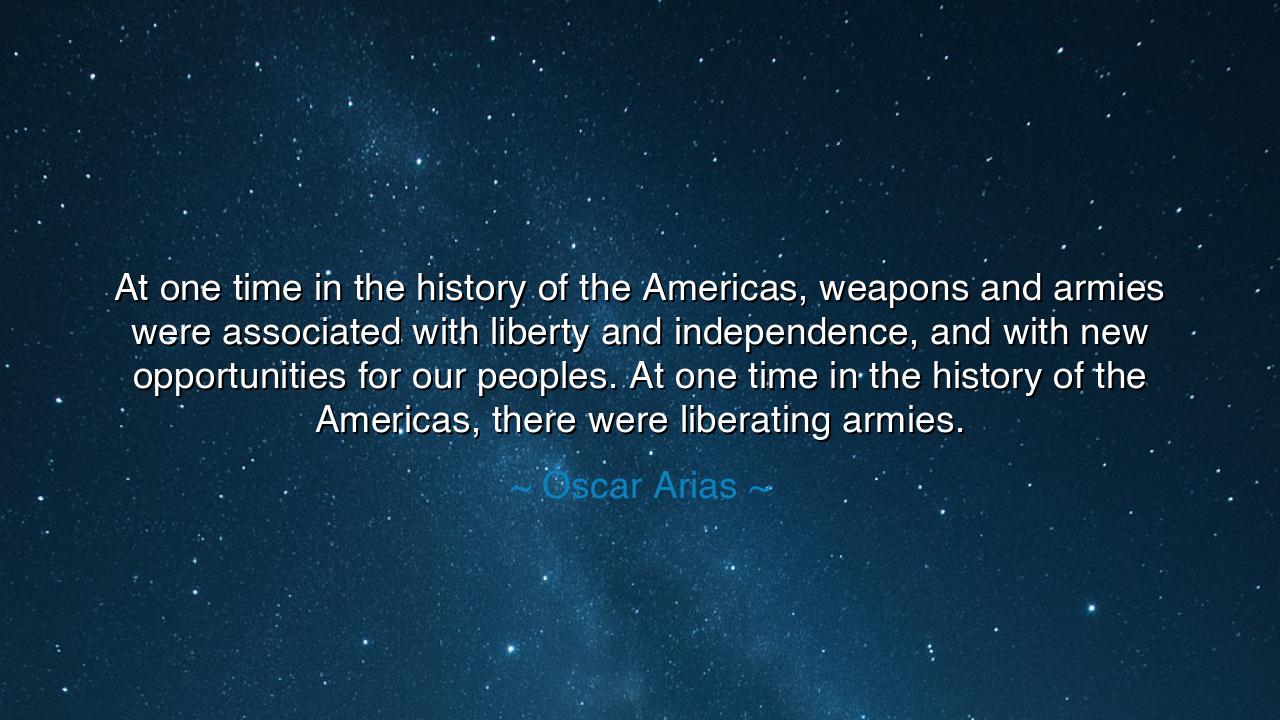
At one time in the history of the Americas, weapons and armies
At one time in the history of the Americas, weapons and armies were associated with liberty and independence, and with new opportunities for our peoples. At one time in the history of the Americas, there were liberating armies.






“At one time in the history of the Americas, weapons and armies were associated with liberty and independence, and with new opportunities for our peoples. At one time in the history of the Americas, there were liberating armies.” Thus spoke Óscar Arias, the Costa Rican leader and Nobel laureate, whose voice rose not in the echo of gunfire but in the song of peace. His words are both remembrance and rebuke — a reflection on a past where men took up arms for freedom, and a lament for a present where those same arms too often serve oppression. In this statement, Arias calls us to examine how the tools once used to break chains have become the instruments that forge them anew.
In the age of revolutions, when the Americas stirred from the sleep of colonialism, weapons and armies bore noble purpose. They were the hands of liberation, wielded not for conquest but for deliverance. Across mountains and jungles, men and women rose with muskets and hope, crying for independence, for the right to shape their own destinies. They fought beneath banners of liberty — Bolívar in the north, San Martín in the south, Hidalgo and Morelos in Mexico — their causes lit by the same divine flame that burned in every heart that ever longed to be free. In those days, to take up the sword was to take up the burden of justice; to march into battle was to march toward the birth of a nation.
Yet, as Arias reminds us, time is the great transformer. The liberating armies of old gave way to the armies of ambition. The weapons that once defended the weak became the tools by which the powerful maintained control. The cry of “independence” faded, replaced by the murmur of fear. The soldier’s nobility was replaced by the general’s pride; the struggle for liberty turned inward, consuming its own children. The heroes who once overthrew tyranny were succeeded by rulers who used the same weapons to silence dissent. Thus, the instruments of freedom became the guardians of oppression — the liberator’s sword now turned against his own people.
Consider the tale of Simón Bolívar, the great Liberator of South America. He freed nations, yet his dream of unity dissolved in the blood of civil war. He had longed to see the Americas rise in peace and fraternity, yet his generals fought among themselves, and the republics he founded fractured into pieces. Bolívar died disillusioned, murmuring that “those who have served the revolution have plowed the sea.” It is his tragedy that Arias invokes — that the fire of liberation, left untamed, can burn the very hands that kindled it. What once was sacred can become corrupted if power, not principle, becomes its goal.
In speaking these words, Arias draws from his own nation’s example. Costa Rica, under his leadership and that of others before him, did what few nations dared: it abolished its army. Where others saw vulnerability, Costa Rica found strength — for it invested not in weapons, but in education, health, and democracy. And in doing so, it proved to the world that true independence does not rest upon the sword, but upon the will of a people to live justly and in peace. This is the deeper meaning of Arias’s lament: he honors the armies that once freed the Americas, but calls us to see that liberation cannot be sustained through perpetual war. The true liberating force of our age must be the courage to choose peace.
The wisdom of the ancients whispers through his words: “He who conquers others is strong, but he who conquers himself is mighty.” The new struggle is no longer against empires, but against the darker empires within — greed, hatred, and fear. The independence that once required muskets now demands morality; the liberty that once called for revolution now calls for reconciliation. The time of liberating armies has passed; the time of liberating hearts has come.
So let this be the lesson for all who inherit the freedom bought with blood: honor the past, but do not live in its shadow. Remember the soldiers who fought for liberty, but do not mistake their weapons for wisdom. Build nations not upon fear, but upon justice; defend freedom not with violence, but with virtue. For as Arias teaches, the truest independence is not the one that casts off a foreign ruler, but the one that frees a people from the cycle of war.
And so, dear listener, carry this teaching into your own life: be a liberator, but of a different kind. Free your heart from bitterness, your mind from prejudice, your soul from apathy. For the age of liberating armies may be gone, but the age of liberating spirits — that, my child, must never end.






AAdministratorAdministrator
Welcome, honored guests. Please leave a comment, we will respond soon